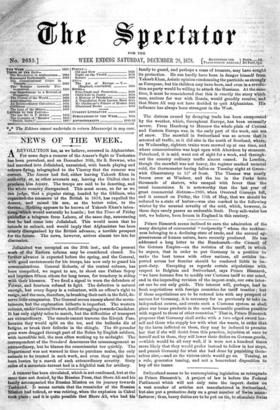Prince Bismarck seems inclined to earn the admiration of the
many disciples of commercial " reciprocity " whom the reckless- ness belonging to a declining state of trade, and the natural ag- gressiveness of human nature, have recently produced. He has addressed a long letter to the Bundesrath—the Council of the German Empire—on the revision of the tariff, in which he argues, that in order to put Germany in a position to make the best terms with other nations, all articles im- ported across her frontier should he rendered liable to im- port-duty. Excepting as regards certain stipulations with respect to Belgium and Switzerland, says Prince Bismarck, "we have become free to modify our Customs tariff to our mind, and in the impending revision of the impost-scale, our own inter- est can be our only guide. This interest will, perhaps, lead to fresh negotiations with foreign countries for tariff treaties ; but if these negotiations are to be entered into with any prospect of success for Germany, it is necessary for us previously to take an independent course, and create such a Customs system as shall place our home products in the most favourable position possible with regard to those of other countries." That is, Prince Bismarck proposes that Germany shall strike with a two-edged sword her- self and those who supply her with what she wants, in order that by the harm inflicted on them, they may be induced to promise her that if she will desist from this practice, injurious at once to herself and to them, they will lower their duties on German goods, —which would be all very well, if it were not a hundred times more likely that they would prefer instead to follow in her steps, and punish Germany for what she had done by punishing them- selves also,—and so the vicious circle would go on. Teasing, as a rule, generates teasing, and not a benevolent disposition to buy off the teaser.


































